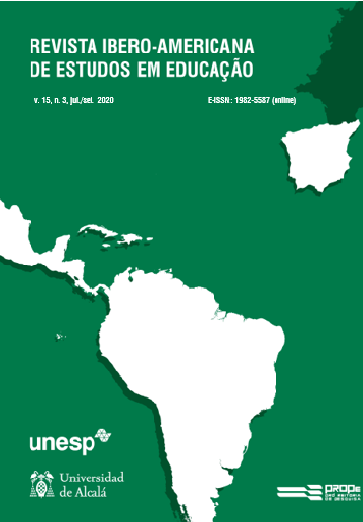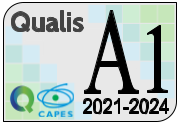Análise das propriedades psicométricas do questionário epistemológico-inventário de crenças epistemológicas (CEICE) em universitários espanhóis
DOI:
https://doi.org/10.21723/riaee.v15i3.12553Palavras-chave:
Crenças epistemológicas, Análise fatorial confirmatória, Invariância fatorial, Confiabilidade, Estudantes universitários.Resumo
Crenças Epistemológicas (CE) são considerações sobre conhecimento e aprendizagem que influenciam o desempenho e a motivação dos alunos. O objetivo deste estudo é analisar as propriedades psicométricas do teste do questionário epistemológico-inventário de crenças epistemológicas (CEICE em espanhol) em estudantes universitários espanhóis, incluindo uma análise confirmatória de sua estrutura fatorial, confiabilidade e invariância fatorial de acordo com gênero, ano e área de estudo e descrição dos escores da escala. Para realizar os objetivos, o teste CEICE foi aplicado a uma amostra de 1.231 estudantes espanhóis e foi analisado por análise fatorial confirmatória, multigrupos e estatística descritiva. Los resultados confirman la estructura de cuatro factores (simpleza del conocimiento, certeza del conocimiento, velocidad del aprendizaje y habilidad innata). Los coeficientes Alpha de Cronbach muestran valores similares a los obtenidos en estudios previos y los Alpha Ordinal presentan fiabilidades más altas. A invariância fatorial entre os grupos analisados nos níveis configural e métrico é confirmada. O CEICE possui propriedades psicométricas adequadas e pode ser usado por psicólogos e educadores para medir EC e estabelecer comparações entre grupos.Downloads
Referências
BARZILAI, Sarit; ZOHAR, Anat. Reconsidering personal epistemology as metacognition: a multifaceted approach to the analysis of epistemic thinking. Educational Psychologist, v. 49, p. 13-35, 2014. DOI: http://dx.doi.org/10.1080/00461520.2013.863265
BRÅTEN, Ivar; BRITT, Anne; STRØMSØ, Helge; ROUET, Jean-Francoise. The Role of Epistemic Beliefs in the Comprehension of Multiple Expository Texts: Toward an Integrated Model. Educational Psychologist, v. 46, n. 1, p. 48-70, 2011. DOI: http://dx.doi.org/10.1080/00461520.2011.538647
BROWN, Timothy; MOORE, Michel. Conformatory factor analysis. In: HOYLE, R. H. (Ed.). Handbook of structural equation modeling. New York: Guilford, 2014, p. 361-379.
BROMME, Rainer; PIESCHL, Stephanie; STAHL, Elmar. Epistemological beliefs are standards for adaptive learning: a functional theory about epistemological beliefs and metacognition. Metacognition and Learning, v. 5, p. 7-26, 2010. DOI: 10.1007/s11409-009-9053-5
CASTAÑEDA, Sandra; PEÑALOSA, Eduardo. Validando constructos en epistemología personal. Revista Mexicana de Psicología, v. 27, n. 1, p. 65-75, 2010. Disponível em: http://www.redalyc.org/articulo.oa?id=243016325007. Acesso em: 10 jan. 2019.
CHEUNG, Gordon; RENSVOLD, Roger. Evaluating goodness-of-fit indexes for testing MI. Structural Equation Modeling, v. 9, n. 2, p. 235-55, 2002. DOI: https://doi.org/10.1207/S15328007SEM0902_5
DIMITROV, Dimiter. Testing for factorial invariance in the context of construct validation. Measurement and Evaluation in Counseling and Development, v. 43, n. 2, p. 121-149, 2010. DOI: 10-1177/0748175610373459
EKINCI, Necla. Examining the Relationships between Epistemological Beliefs and Teaching and Learning Conceptions of Lower-Secondary Education Teachers, Inonu University Journal of the Faculty of Education, v. 18, n. 1, p. 344-358, 2017. DOI: 10.17679/inuefd.307065
FERRANDO, Pere-Joan; ANGUIANO, Cristina. El análisis factorial como técnica de investigación psicológica. Papeles del Psicólogo, v. 31, n.1, p.18-33, 2010. Disponível em: http://www.papelesdelpsicologo.es/pdf/1793.pdf. Acesso em: 10 jan. 2019.
FREIGBERG, Agustin; LEDESMA, Rubén; FERNÁNDEZ, María Mercedes. Análisis de las Propiedades Psicométricas del Inventario de Estrategias de Aprendizaje y Estudio (LASSI) en Estudiantes Universitarios. Revista Iberoamericana de Diagnóstico y Evaluación – e Avaliação Psicológica, v. 2, n. 44, p. 1-20, 2017. Disponível em: https://www.aidep.org/sites/default/files/2017-09/R44-Art10.pdf. Acesso em: 10 jan. 2019.
GADERMANN, Anne; GUHN, Martin; ZUMBO, Bruno. Estimating ordinal reliability for Likert-type and ordinal item response data: A conceptual, empirical, and practical guide. Practical Assessment, Research & Evaluation, v. 17, n. 3, p. 1-13, 2012. Disponível em: http://pareonline.net/getvn.asp?v=17&n=3. Acesso em: 10 jan. 2019.
GOK, Tolga. The evaluation of conceptual learning and epistemological beliefs on physics learning by think-pair-share. Journal of Education in Science, Environment and Health, v. 4, n. 1, p. 69-80, 2018. DOI: 10.21891/jeseh.387489
HOFER, Barbara.; PINTRICH, Paul. The Development of Epistemological Theories: Beliefs About Knowledge and Knowing and Their Relation to Learning. Review of Educational Research, v. 67 n. 1, p. 88-140, 1997. DOI: http://dx.doi.org/10.3102/00346543067001088
JÖRESKOG, Karl-Gustav; SÖRBOM, Dag. LISREL 9. Chicago: Scientific Software International, 2017.
LASTER, Bonnie Bost. A structural and correlational analysis of two common measures of personal epistemology. Tesis Doctoral no publicada. Oklahoma State University, EEUU. 2010.
LEE, Wen-Cing; CHIU, Yen-Lin; LIANG, Jyh-Chong; TSAI, Ching-Chung Exploring the structural relationships between high school students’ Internet-specific epistemic beliefs and their utilization of online academic help seeking. Computers in Human Behavior, v. 36, p. 391-400, 2014. DOI: https://doi.org/10.1016/j.chb.2014.03.069
LEAL, Francisco; FERRER, Rodrigo. Three-factor structure for Epistemic Belief Inventory: A cross-validation study. PLoS One, v. 12, n. 3, e0173295, 2017. DOI: 10.1371/journal.pone.0173295
LEHRER, Keith. Theory of knowledge. 2. ed. New York: Routledge, 2018.
LITTLE, Tood; CARD, Noel; SLEGERS, David; LEDFORD, Emily. Modeling contextual effects with multiple group MACs models. In: LITTLE, T. D.; BOVAIRD, J. A.; CARD, N. A. (Eds.). Modeling contextual effects in longitudinal studies. Mahwah, NJ: Laurence Erlbaum, 2007.
MESSICK, Samuel. The Standard problem: Meaning and values in Measurement and Evaluation. American Psychologist, v. 30, p. 955-966, 1975.
NAYEBI, Roya; TAHRIRI, Abdorreza. A study of epistemological beliefs of EFL learners across gender and educational level. International Journal of Research Studies in Psychology, v. 3, n. 3, p.17-28, 2014. DOI: 10.5861/ijrsp.2014.754
ORDÓÑEZ, Xavier; PONSODA, Vicente; ABAD, Francisco; ROMERO, Sonia. Measurement of Epistemological Beliefs. Psychometric Properties of the EQEBI Test Scores. Educational and Psychological Measurement, v. 69, n. 2, p. 287-302, 2009. DOI: http://dx.doi.org/10.1177/0013164408323226
PAECHTER, Manuela; REBMANN, Karen; SCHLOEMER, Tobias; MOKWINSKI, Bjoern; HANEKAMP, Yvonne; ARENDASY, Martin. Development of the oldenburg epistemic beliefs questionnaire: a german questionnaire based on the Epistemic Belief Inventory (EBI). Current Issues in Education, v. 16, n. 1, p. 1-18.
PÄULER, Lena; JUCKS, Regina. Perspectives on teaching: Conceptions of teaching and epistemological beliefs of university academics and students in different domains. Active Learning in Higher Education, v. 18, n. 1, p. 63-76, 2017. DOI: 10.1177/1469787417693507
ROMERO, Sonia; ORDÓÑEZ. Métodos, diseños y técnicas de investigación en psicología y educación. Madrid: CEF ediciones, 2017.
SAVOJI, Azar. P., NIUSHA, Beheshteh; BOREIRI, Leila. Relationship between epistemological beliefs, self-regulated learning strategies and academic achievement. Procedia - Social and Behavioral Sciences, v. 84, 1160-1165, 2013. DOI: 10.1016/j.sbspro.2013.06.719
SCHRAW, Gregory; BENDIXEN, Lisa; DUNKLE, Michael. Development and validation of the Epistemic Belief Inventory (EBI). In: HOFER, B. K.; PINTRICH, P. R. (Eds.). Personal epistemology: The psychology of beliefs about knowledge and knowing. Mahwah, NJ: Lawrence Erlbaum, 2002, p. 261-275.
SCHRAW, Gregory. Conceptual Integration and Measurement of Epistemological and Ontological Beliefs in Educational Research. ISRN Education, p. 1-19, jan. 2013. DOI: http://dx.doi.org/10.1155/2013/327680
SCHOMMER, Marlene. Effects of beliefs about the nature of knowledge on comprehension. Journal of Educational Psychology, v. 82, p. 498-504, 2009. DOI: http://dx.doi.org/10.1037/0022-0663.82.3.498
SCHOMMER, Marlene. The influence of age and education on epistemological beliefs. British Journal of Educational Psychology, v. 68, p. 551-562, 2013. DOI: http://dx.doi.org/10.1111/j.2044-8279.1998.tb01311.x
TEO, Timothy. Examining the psychometric properties of the Epistemic Belief Inventory (EBI). Journal of Psychoeducational Assessment, v. 31, n.1, p.72-79, 2013. DOI: http://dx.doi.org/10.1177/0734282912449436
TEO, Timothy; Chai, C-S. Confirmatory factor analysis of the Epistemic Belief Inventory (EBI): a cross-cultural study. International Journal of Educational and Psychological Assessment, v. 9, n. 1, p. 1-13, 2011.
TREVORS, Gregory; FEYZI, Reza; AZEVEDO, Roger; BOUCHET, Francoise. Self-regulated learning processes vary as a function of epistemic beliefs and contexts: Mixed method evidence from eye tracking and concurrent and retrospective reports. Learning and Instruction, v. 42, p. 31-46, 2016. DOI: https://doi.org/10.1016/j.learninstruc.2015.11.003
TREVORS, Gregory; MUIS, Krista; PEKRUN, Reinhard; SINATRA, Gaile; MUIJSELAAR, Marloes. Exploring the relations between epistemic beliefs, emotions, and learning from texts. Contemporary Educational Psychology, v. 48, p. 116-132, 2017. DOI: https://doi.org/10.1016/j.cedpsych.2016.10.001
WELCH, Anita; RAY, Chris. A preliminary report of the pscychometric properties of the Epistemic Beliefs Inventory. The European Journal of Social and Behavioural Sciencies, v. 2, n. 1, p. 278-303, 2012. DOI: http://dx.doi.org/10.15405/FutureAcademy/ejsbs(2301-2218).2012.2.12
Downloads
Publicado
Como Citar
Edição
Seção
Licença
Copyright (c) 2020 Revista Ibero-Americana de Estudos em Educação

Este trabalho está licenciado sob uma licença Creative Commons Attribution-NonCommercial-ShareAlike 4.0 International License.
Manuscritos aceitos e publicados são de propriedade dos autores com gestão da Ibero-American Journal of Studies in Education. É proibida a submissão total ou parcial do manuscrito a qualquer outro periódico. A responsabilidade pelo conteúdo dos artigos é exclusiva dos autores. A tradução para outro idioma é proibida sem a permissão por escrito do Editor ouvido pelo Comitê Editorial Científico.








